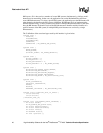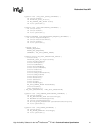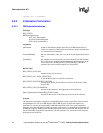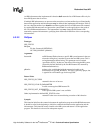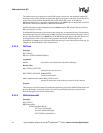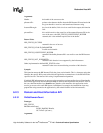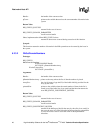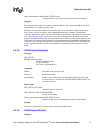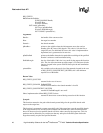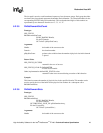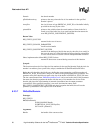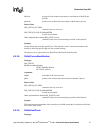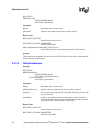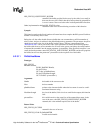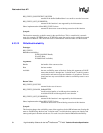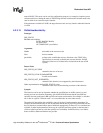
48 High Availability Software for the Intel
®
NetStructure
TM
ZT 4901 Technical Product Specification
Redundant Host API
HSI_STATUS
RhGetDomainSlotPath (
IN RH_HANDLE Handle,
IN uint32 Host,
IN uint32 Domain,
OUT uint16 *pRootBus,
OUT char *pOutSlotPath,
IN uint32 SlotPathLength,
OUT ULONG *pActualSize );
Arguments:
Handle – the handle of the current session
Host - the target host number
Domain – the domain number
pRootBus – pointer to the variable where the infrastructure stores the root bus
number of the PCI tree of this domain. This value is 0 for the first or
single PCI tree. For additional PCI trees, this value is implementation-
dependent, but is guaranteed to be non-zero.
pOutSlotPath pointer to the buffer where the slot path of the root bridge of the specified
domain is written as a null-terminated string
SlotPathLength the size of the buffer; if this size is too small for the output, this function
fails. The size of the maximum possible output is 513 characters (for the
longest slot path in the system with 256 buses plus the null termination
character).
pActualSize - this variable receives the actual size of the returned slot path; in the case
of HSI_STATUS_INSUFFICIENT_BUFFER, this is the minimum
required size of the buffer.
Return Value:
HSI_STATUS_SUCCESS
returned in the case of success
HSI_STATUS_INVALID_PARAMETER
invalid session handle or the domain number is invalid
HSI_STATUS_INSUFFICIENT_BUFFER
returned if SlotPathLength is too small
Other, implementation-defined HSI_STATUS values
returned if other errors occurred during execution of this function
Synopsis:
This function returns the slot path of the domain parent bridge for the specified domain with
respect to the target host.
This function is guaranteed to return successfully only if the target host owns the specified domain.
If the target host does not own the specified domain, the function fails, unless the infrastructure
knows in advance what slot path the domain will have when owned by the target host. This slot
path must not be affected by any switchovers that may take place in the RH system before the
target host actually acquires the specified domain.



